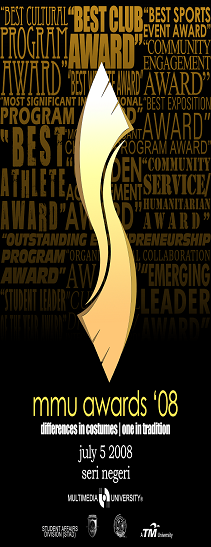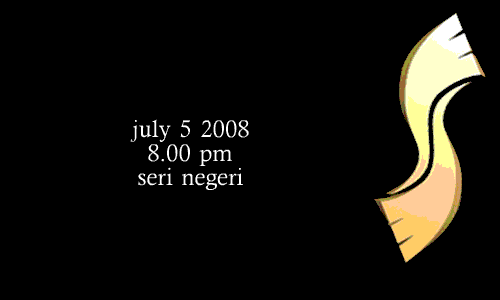Conference Report
PICC 2008
By Tang Lee Hong, Zulfazlizan, Shahida, Subashini, Abu Husin, Syahir Akmal
Introduction:
Main Content:
After the brief introduction from him, he started with some quotes to motivate the participants. According to him, many people are looking for a good leader, but they need a person who can work well with the team. This statement means that a leader not only needs to be competence solely but have to be able to perform in a team as well. He also mentioned that mental strength is the key to success for a person who leads. Mental strength can be clearly seen from him as the Malaysia first astronaut who is being so determined, fearless, and strong. He shared his experiences where he tried to involve in different fields in order to seek for his real interest. He assured the participants that there is no wrong trying in different fields before we can really find our ultimate life goal.
For him, he has been dreaming to become an astronaut since he was 10 years old. He had been working hard for 15 years to make his dream a realistic now. Again, he told the undergraduates who attended that day there should be no restriction in having ambition in life. When there is a will, there is a way. Dream can be realized if we really work hard towards it. One thing he kept stressing on is to believe in ourselves and not to fear on the obstacles ahead. We must take steps to be brave and motivate ourselves from time to time.
During in space, he shared his experience on how to carry out his “solat” as a Muslim. Other than that, we also shared his experiences on how to fast in space and celebrate his Ramadhan there. He also told the undergraduates that the foreigners really love Malaysia local delicacies and foods a lot. Aside from that, he touched about his experiments during in ISS. He had been carried out an experiment on the growth of cell and cancer cell in space in order to assist in the medical field on finding the cure for cancer. Other than that, he also shared his feeling when he looks at planet Earth from space. He described it as the most magnificent scene he ever seen in his life and at that moment he can feel the greatness of the universe creator, Allah. By looking at earth as a whole also inspire him to care more about global issues instead of merely country issue. This would include issues like pollution, war, hunger and so on. He also shared stories which everyone curious the most, by telling the audience how he went for toilet.
The memorable moment in his life ended very fast, and day before he leaved the space, he heard azan which can not be heard by others in the ISS. This remind him that it is time to go back to Earth and serve the rest with what he has gained. Now, it is time for him to go around Malaysia and inspire more people as this is not his mission alone but it is the mission of the rest of Malaysians as well. At the same time, he still can feel his passion in medical field and he does not want to neglect it. So, in rotation, we will go back to his work at least 2 times a week. Added to this, he told the rest that it is enjoyable to do whatever we have passion and enthusiasm towards it.
Before he ended his part, he stressed on the importance of staying focus on whatever we convey and be less selfish as we share, the more people benefited from it, the more we gain ourselves as well. We must also be brave, confident, and able to lead. There is one quote from his speech saying “what the mind believes, the body can achieve”. Then, he ended his talk.
Conclusion:
Dr Sheikh Muszaphar had conveyed his message through a very close-to-audience method whereby he inspire through the sharing of experience instead of throwing a bunch of theories to the audience. The talk was very exciting and full with surprise as he shared many special moments in his journey to space. The talk manages to catch most of the audience attention and hopefully it can really inspire more people to follow his path and become the future astronaut of Malaysia. Of course, another great dream is to have our own space rocket and launch centre. This dream can only be realized if there is really a great awareness among Malaysia community and from there we have a group of talented and skillful people. Then only the dream is possible to be realized.









2 comments:
Definition
Until 2003, astronauts were sponsored and trained exclusively by governments, either by the military, or by civilian space agencies. However, with the first sub-orbital flight of the privately-funded SpaceShipOne in 2004, a new category of astronaut was created: the commercial astronaut. With the rise of space tourism, NASA and the Russian Federal Space Agency agreed to use the term "spaceflight participant" to distinguish those space travelers from astronauts on missions coordinated by those two agencies.
The criteria for what constitutes human spaceflight vary. The Fédération Aéronautique Internationale (FAI) defines spaceflight as any flight above an altitude of 100 kilometers (62 mi). However, in the United States, professional, military, and commercial astronauts who travel above an altitude of 80 kilometers (50 mi) are awarded astronaut wings.
As of March 11, 2008, a total of 474 humans from 34 countries have reached 100km or more in altitude, of which 471 reached Low Earth orbit or beyond.[3][4] Of these, 24 people have traveled beyond Low Earth orbit, to either lunar or trans-lunar orbit or to the surface of the moon; three of the 24 did so twice (Lovell, Young and Cernan).[5] According to the FAI guideline, 476 people qualify under the U. S. definition as having reached space.[6] Space travelers have spent over 30,400 astronaut-days (or a cumulative total of over 83 years) in space, including over 100 astronaut-days of spacewalks.[6][7] As of 2007, the man with the longest time in space is Sergei K. Krikalev, who has spent 803 days, 9 hours and 39 minutes, or 2.2 years, in space.[8][9] Sunita L. Williams holds the record for most time in space by a woman, with 195 days spent in space.[10][11]
For other uses, see Astronaut (disambiguation).
"Spaceman" redirects here. For other uses, see Spaceman (disambiguation).
Astronaut Bruce McCandless II using a manned maneuvering unit outside the U.S. Space Shuttle Challenger in 1984
Astronaut Bruce McCandless II using a manned maneuvering unit outside the U.S. Space Shuttle Challenger in 1984
An astronaut or cosmonaut (Russian: космона́вт Russian pronunciation: [kəsmɐˈnaft]) is a person trained by a human spaceflight program to command, pilot, or serve as a crew member of a spacecraft.
While generally reserved for professional space travelers, the term is sometimes applied to anyone who travels into space, including scientists, politicians, journalists, and tourists.[1][2]
please don t waste people s time talking about such a huge waste of tax payers money . he is no astronaut.
read
On November 15, 2006, in a response to a question in the Dewan Rakyat, Agriculture and Agro-based Industry Ministry parliamentary secretary Datuk Rohani Abdul Karim (representing the Science, Technology and Innovation Ministry) stated that the Malaysian astronaut would, "spin top and toss Batu Seremban (five-stone game) as part of an experiment during his space travel". She added, "The astronaut will also paint a batik motif and make "teh tarik" ("pulled" tea) which would be shared with his fellow astronauts."[6].
However, on December 18, 2006, Science, Technology and Innovation Minister Datuk Seri Dr Jamaluddin Jarjis said that making teh-tarik in space would not happen. Various experiments drawn up by selected Malaysian institutes would be carried out by the Malaysian astronaut while in zero-gravity. In the planned physics education (live class in space) portion of the spaceflight, the astronaut will also be, "demonstrating the behavior of fluids" and "observing the effects of a spinning object", to show Malaysian students on the ground the effects of zero-gravity on selected physical phenomena.[7]
[edit] Criticism
The cost of sending Sheikh Muszaphar into space has been estimated at RM 105 million (approximately USD 26 million). The entire Malaysian space program has been criticized as a waste of money for a developing nation that could ill afford such indulgences.[8].
This particular posting was made based on the presentation at RUC08.
We are more concerned at what was presented and what the participants of RUC08 were able to learn from the presentations rather than arguing the title/"gelaran" for Dr Sheikh.
Post a Comment